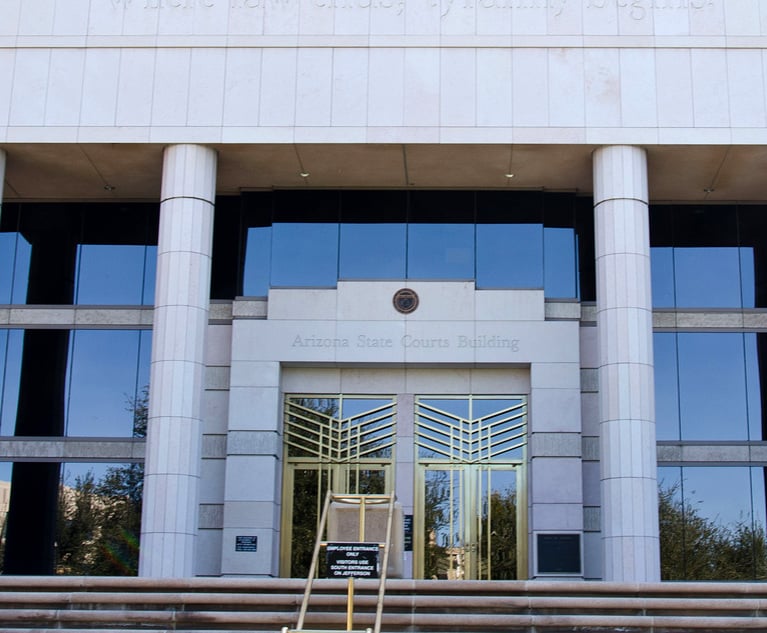David Aronstam Found Path to Peace From Anxiety and Abuse
Despite career success, Aronstam felt fearful of being judged and uncomfortable in his own skin before finding treatment and beginning to help others like him.
May 12, 2019 at 07:00 PM
7 minute read
 "I really can't tell you what my work life was like because smoking cocaine and practicing law doesn't really mix," he said. "I know I went to court. Don't ask me what happened. I don't remember." Aronstam, who had succeeded in every aspect of his life, was baffled that he was "a total failure at quitting drugs." It turned out, he said, he was failing because he tried to do it alone. He would eventually find his way, but it took work, and help from others. Growing up in South Africa, Aronstam drank excessively by his early teens and smoked pot regularly. But when it was time for exams, he abstained. He graduated third in his law school class. In social situations, Aronstam felt terribly awkward. But he liked the partying and how his inhibitions lifted under the influence. Ambitious and a high achiever, he deftly concealed the extent of his substance use. Nevertheless, by the time he emigrated from South Africa to the United States in the early 80s, the seeds of addiction had firmly taken root. He believes that his early drinking and drug use and a genetic predisposition paved the way for his substance abuse. But for a while, he kept it under control. He settled in New York, where he passed the bar exam in 1984. As a newly minted lawyer, he found a job as an associate at a prestigious boutique firm, McLaughlin & Stern, in downtown Manhattan. He frequented New York City Bar Association events where he socialized with other lawyers, but he reserved the heavy drinking and drug use for the weekends. "There would be hangovers. Sure. But that was the exception," he said. McLaughlin & Stern disbanded and reorganized in 1992, and Aronstam found himself out of a job. It was a temporary setback, though. He launched a solo practice and soon his business was booming. Then four days after Thanksgiving in 1995, Aronstam, 40, had a massive heart attack. His wife summoned an ambulance, and he was rushed to Cabrini hospital, which was just three blocks from their apartment on E. 15th Street. His heart had stopped working, and he was declared dead on arrival. In what Aronstam sees as a sign from a higher power, the heart muscle that had been destroyed came back to life. Still, he had to undergo open-heart surgery, which led to a difficult, year-long recovery. "I was too sick for a while to do anything," he said. "It took about a year for the wound to heal and for me to even start feeling a semblance of normalcy." But the better he felt physically the deeper his desire became for drugs and alcohol. "The heart attack was the dividing line, because I consider the shock of the heart attack resulted in a form of PTSD and it kicked up my alcohol and addiction," he said. The one drink a day turned into two and then three. He resumed smoking pot. And then at a party one night, the inevitable happened. "Someone puts out some lines of cocaine on the table. My intellect is saying that's bad for you and you have a damaged heart, but I've had a couple of drinks," he recounted. Despite giving in to the temptation that night, he mostly kept it together, representing clients while drinking and dabbling in drugs. His marriage was rocky, though, and a year later, his wife walked out. "Now I'm living on my own and my drinking and drugging is progressing and I'm still going to work every day," he said. A lawyer friend, noting Aronstam's disheveled appearance and erratic work schedule, urged him to lay off the alcohol and drugs. The friend stayed on his case, but eventually his efforts waned as the friend confronted problems of his own—hepatitis C that turned into terminal liver cancer. His death removed Aronstam's only anchor. Still, somehow, Aronstam held onto a couple of major clients. He had millions of dollars in escrow, but safeguarded the money while going deep into debt to buy drugs. Eventually, Aronstam established a relationship with a new girlfriend who disapproved of drugs and drank very little. In the beginning, he managed to hide the extent of his addiction from her. He woke up practically every other day vowing to stay sober and avoid the drugs, but failed each time. Then his abuse escalated to the point where he would disappear for long stretches. One time, he stayed with a friend in Vermont for 10 days, blackout drunk the whole time. When he returned, the girlfriend, another friend and his only high-profile client each gave him an ultimatum: Go to rehab, or we're out of your life. So he went. "Upon entering recovery, I learned about the nature of my addiction and that my self-help efforts were doomed to failure," he said. During intensive outpatient sessions four days a week for eight weeks, he accepted the fact that he couldn't recover without help. Once the intensive phase ended, he tapered down to first two sessions a week and then one, staying with it for about a year. "I learned that I needed outside help," he said. "It was a very simple and powerful explanation of my disease and the remedy." He went to meetings with other addicts and had a mentor who gave him feedback. "I learned that if I took one drink or drug, it triggered a craving that was unstoppable," he said. Through meditation and a spiritual practice, Aronstam said, he's become more tolerant and forgiving. If he makes a mistake now, he makes amends and set things right. With his clients, he tries to be satisfied that he has given a matter his best effort even if he doesn't get a good result. "Having looked back at my life I see symptoms from my earliest memories. That there was something different about me. I didn't feel comfortable in my own skin. I was fearful of people. I was fearful of being judged. And then I took a drink and a drug and I felt comfortable," he said. After six years of being sober, he got involved with the New York State Bar Association and New York City Bar Association lawyer assistance programs. He helps lawyers and law students with problems similar to his own. "It makes me stop thinking about myself," he said. "It's a whole feeling of self-esteem and self-worth helping another person. It helps me stay sober." This story is part of a special report on mental health and the legal profession from Law.com: Minds over Matters.
"I really can't tell you what my work life was like because smoking cocaine and practicing law doesn't really mix," he said. "I know I went to court. Don't ask me what happened. I don't remember." Aronstam, who had succeeded in every aspect of his life, was baffled that he was "a total failure at quitting drugs." It turned out, he said, he was failing because he tried to do it alone. He would eventually find his way, but it took work, and help from others. Growing up in South Africa, Aronstam drank excessively by his early teens and smoked pot regularly. But when it was time for exams, he abstained. He graduated third in his law school class. In social situations, Aronstam felt terribly awkward. But he liked the partying and how his inhibitions lifted under the influence. Ambitious and a high achiever, he deftly concealed the extent of his substance use. Nevertheless, by the time he emigrated from South Africa to the United States in the early 80s, the seeds of addiction had firmly taken root. He believes that his early drinking and drug use and a genetic predisposition paved the way for his substance abuse. But for a while, he kept it under control. He settled in New York, where he passed the bar exam in 1984. As a newly minted lawyer, he found a job as an associate at a prestigious boutique firm, McLaughlin & Stern, in downtown Manhattan. He frequented New York City Bar Association events where he socialized with other lawyers, but he reserved the heavy drinking and drug use for the weekends. "There would be hangovers. Sure. But that was the exception," he said. McLaughlin & Stern disbanded and reorganized in 1992, and Aronstam found himself out of a job. It was a temporary setback, though. He launched a solo practice and soon his business was booming. Then four days after Thanksgiving in 1995, Aronstam, 40, had a massive heart attack. His wife summoned an ambulance, and he was rushed to Cabrini hospital, which was just three blocks from their apartment on E. 15th Street. His heart had stopped working, and he was declared dead on arrival. In what Aronstam sees as a sign from a higher power, the heart muscle that had been destroyed came back to life. Still, he had to undergo open-heart surgery, which led to a difficult, year-long recovery. "I was too sick for a while to do anything," he said. "It took about a year for the wound to heal and for me to even start feeling a semblance of normalcy." But the better he felt physically the deeper his desire became for drugs and alcohol. "The heart attack was the dividing line, because I consider the shock of the heart attack resulted in a form of PTSD and it kicked up my alcohol and addiction," he said. The one drink a day turned into two and then three. He resumed smoking pot. And then at a party one night, the inevitable happened. "Someone puts out some lines of cocaine on the table. My intellect is saying that's bad for you and you have a damaged heart, but I've had a couple of drinks," he recounted. Despite giving in to the temptation that night, he mostly kept it together, representing clients while drinking and dabbling in drugs. His marriage was rocky, though, and a year later, his wife walked out. "Now I'm living on my own and my drinking and drugging is progressing and I'm still going to work every day," he said. A lawyer friend, noting Aronstam's disheveled appearance and erratic work schedule, urged him to lay off the alcohol and drugs. The friend stayed on his case, but eventually his efforts waned as the friend confronted problems of his own—hepatitis C that turned into terminal liver cancer. His death removed Aronstam's only anchor. Still, somehow, Aronstam held onto a couple of major clients. He had millions of dollars in escrow, but safeguarded the money while going deep into debt to buy drugs. Eventually, Aronstam established a relationship with a new girlfriend who disapproved of drugs and drank very little. In the beginning, he managed to hide the extent of his addiction from her. He woke up practically every other day vowing to stay sober and avoid the drugs, but failed each time. Then his abuse escalated to the point where he would disappear for long stretches. One time, he stayed with a friend in Vermont for 10 days, blackout drunk the whole time. When he returned, the girlfriend, another friend and his only high-profile client each gave him an ultimatum: Go to rehab, or we're out of your life. So he went. "Upon entering recovery, I learned about the nature of my addiction and that my self-help efforts were doomed to failure," he said. During intensive outpatient sessions four days a week for eight weeks, he accepted the fact that he couldn't recover without help. Once the intensive phase ended, he tapered down to first two sessions a week and then one, staying with it for about a year. "I learned that I needed outside help," he said. "It was a very simple and powerful explanation of my disease and the remedy." He went to meetings with other addicts and had a mentor who gave him feedback. "I learned that if I took one drink or drug, it triggered a craving that was unstoppable," he said. Through meditation and a spiritual practice, Aronstam said, he's become more tolerant and forgiving. If he makes a mistake now, he makes amends and set things right. With his clients, he tries to be satisfied that he has given a matter his best effort even if he doesn't get a good result. "Having looked back at my life I see symptoms from my earliest memories. That there was something different about me. I didn't feel comfortable in my own skin. I was fearful of people. I was fearful of being judged. And then I took a drink and a drug and I felt comfortable," he said. After six years of being sober, he got involved with the New York State Bar Association and New York City Bar Association lawyer assistance programs. He helps lawyers and law students with problems similar to his own. "It makes me stop thinking about myself," he said. "It's a whole feeling of self-esteem and self-worth helping another person. It helps me stay sober." This story is part of a special report on mental health and the legal profession from Law.com: Minds over Matters.This content has been archived. It is available through our partners, LexisNexis® and Bloomberg Law.
To view this content, please continue to their sites.
Not a Lexis Subscriber?
Subscribe Now
Not a Bloomberg Law Subscriber?
Subscribe Now
NOT FOR REPRINT
© 2025 ALM Global, LLC, All Rights Reserved. Request academic re-use from www.copyright.com. All other uses, submit a request to [email protected]. For more information visit Asset & Logo Licensing.
You Might Like
View All
The Law Firm Disrupted: With KPMG's Proposed Entry, Arizona's Liberalized Legal Market is Getting Interesting

Ex-Marathon General Counsel Takes Legal Reins of Another Energy Company

Trending Stories
- 1On the Move and After Hours: Meyner and Landis; Cooper Levenson; Ogletree Deakins; Saiber
- 2State Budget Proposal Includes More Money for Courts—for Now
- 3$5 Million Settlement Reached With Stone Academy
- 4$15K Family Vacation Turned 'Colossal Nightmare': Lawsuit Filed Against Vail Ski Resorts
- 5Prepare Your Entries! The California Legal Awards Have a New, February Deadline
Who Got The Work
Michael G. Bongiorno, Andrew Scott Dulberg and Elizabeth E. Driscoll from Wilmer Cutler Pickering Hale and Dorr have stepped in to represent Symbotic Inc., an A.I.-enabled technology platform that focuses on increasing supply chain efficiency, and other defendants in a pending shareholder derivative lawsuit. The case, filed Oct. 2 in Massachusetts District Court by the Brown Law Firm on behalf of Stephen Austen, accuses certain officers and directors of misleading investors in regard to Symbotic's potential for margin growth by failing to disclose that the company was not equipped to timely deploy its systems or manage expenses through project delays. The case, assigned to U.S. District Judge Nathaniel M. Gorton, is 1:24-cv-12522, Austen v. Cohen et al.
Who Got The Work
Edmund Polubinski and Marie Killmond of Davis Polk & Wardwell have entered appearances for data platform software development company MongoDB and other defendants in a pending shareholder derivative lawsuit. The action, filed Oct. 7 in New York Southern District Court by the Brown Law Firm, accuses the company's directors and/or officers of falsely expressing confidence in the company’s restructuring of its sales incentive plan and downplaying the severity of decreases in its upfront commitments. The case is 1:24-cv-07594, Roy v. Ittycheria et al.
Who Got The Work
Amy O. Bruchs and Kurt F. Ellison of Michael Best & Friedrich have entered appearances for Epic Systems Corp. in a pending employment discrimination lawsuit. The suit was filed Sept. 7 in Wisconsin Western District Court by Levine Eisberner LLC and Siri & Glimstad on behalf of a project manager who claims that he was wrongfully terminated after applying for a religious exemption to the defendant's COVID-19 vaccine mandate. The case, assigned to U.S. Magistrate Judge Anita Marie Boor, is 3:24-cv-00630, Secker, Nathan v. Epic Systems Corporation.
Who Got The Work
David X. Sullivan, Thomas J. Finn and Gregory A. Hall from McCarter & English have entered appearances for Sunrun Installation Services in a pending civil rights lawsuit. The complaint was filed Sept. 4 in Connecticut District Court by attorney Robert M. Berke on behalf of former employee George Edward Steins, who was arrested and charged with employing an unregistered home improvement salesperson. The complaint alleges that had Sunrun informed the Connecticut Department of Consumer Protection that the plaintiff's employment had ended in 2017 and that he no longer held Sunrun's home improvement contractor license, he would not have been hit with charges, which were dismissed in May 2024. The case, assigned to U.S. District Judge Jeffrey A. Meyer, is 3:24-cv-01423, Steins v. Sunrun, Inc. et al.
Who Got The Work
Greenberg Traurig shareholder Joshua L. Raskin has entered an appearance for boohoo.com UK Ltd. in a pending patent infringement lawsuit. The suit, filed Sept. 3 in Texas Eastern District Court by Rozier Hardt McDonough on behalf of Alto Dynamics, asserts five patents related to an online shopping platform. The case, assigned to U.S. District Judge Rodney Gilstrap, is 2:24-cv-00719, Alto Dynamics, LLC v. boohoo.com UK Limited.
Featured Firms
Law Offices of Gary Martin Hays & Associates, P.C.
(470) 294-1674
Law Offices of Mark E. Salomone
(857) 444-6468
Smith & Hassler
(713) 739-1250









